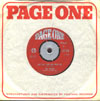|
 -
company sleeves from the 50's to the 80's -
company sleeves from the 50's to the 80's
Click on the images to see a larger version. My comments are bound to be incorrect in places, so please send me
corrections or more info if that's the case. Keep checking back regularly for updates and more scans.
Please do not directly link to these images for your own pages; it won't work.
You require my advance permission to use them; please contact me to make arrangements. The artwork remains copyright of the record company.
Page 5 (Mercury to Parlophone)
(Previous page) (Back to index) (Next page)
Mercury
Another label with a long and varied history, Mercury was started in Chicago in 1945, specialising in jazz, blues and country. In the late 50s, the label was succesful with Brook Benton, Frankie Laine and the Platters. In 1961, Dutch company Philips bought the label, and the two began releasing each others records on opposite sides of the Atlantic - however, UK distribution remained with EMI until 1963. Mercury continued through the 70s (10CC, Rod Stewart, even the Village People) and 80s (Dexy's Midnight Runners, INXS, Tears For Fears). The label is now an imprint of Universal, although new Mercury recordings do still appear in the UK. .jpg) .jpg) | | Featuring the classic Mercury logo, this red and beige striped design was found on UK Mercury releases in the late 1950s and early 60s. Note the prominent credits for EMI's distribution. |
.jpg) .jpg) | | Rather redolent of the bold designs used on the other EMI imprints of the time, this fantastic burst of colour with diamonds and diagonal stripes was seen from around 1961. "Music for Every Mood" proclaims the sleeve, while the Mercury logo moves to the top left. |
.jpg) .jpg) | | Once distribution switched to Philips in 1963, the Mercury sleeve design changed again. (Note how similar the centre label is to the contemporary Philips and Fontana designs.) There are two unusual things with this sleeve - the opening is on the right, not at the top (which is intentional), and the cutting has gone slightly wrong (the left of the sleeve is missing, so the right hand side shows part of the 'next' sleeve!). |
New label
Oriole
One of the larger early independent record labels, Oriole was founded in the UK in 1927 by the Levy Company in London. The label had hits through the 50s with jazz and skiffle releases, most notably from Chris Barber and his group. The US Tamla Motown group released many of their earlier hits through Oriole in the UK; these are now some of the rarest Motown releases and command extremely high prices among collectors. But Oriole's biggest hit came in 1962 with Mauren Evans "Like I Do". The label ceased to trade in 1964 when it was sold to CBS. .jpg) .jpg) | | The Oriole sleeve used in the 50s; this is a very early release from 1957. Note that the die-cut centre hole is smaller than most 7" sleeves; it covers some of the label. |
.jpg) .jpg) | | One of the great 60s single sleeves, this snail-like pattern was seen on the Oriole Motown releases amognst others. It's young, it's new, it's exciting! |
Page One
Larry Page started this label in 1966 to release his own pop-orchestral hits, as well as a number of failed attempts in launching his own vocal career. More succesfully, Page One put out records by The Troggs and Vanity Fair, with distribution going through Philips' Fontana business.   | | This is the one and only Page One sleeve. Slight variations do exist with the central labels, though - this one has a raised silver centre, whereas others are just plain red. |
Parlophone
The most famous of EMI's many imprints, Parlophone was actually a German company (and hence the logo isn't really a pound sign, but rather a Germanic letter L for the founder Carl Lindstrom) which became part of the initial EMI when The Gramophone Co and British Columbia merged. After years of releasing easy listening and big band music (Adam Faith, Matt Monro et al), Parlophone hit big in 1962 when label boss George Martin signed The Beatles. And the rest is history! Other big artists followed through the 60s, including The Hollies, Billy J Kramer, Cilla Black and Cliff Bennett. After a quieter period (with only the Pet Shop Boys of note), the label has returned to full strength: Supergrass, the Divine Comedy and Coldplay have all found a home on Parlophone. .jpg) .jpg) | | The earliest of their 7" sleeve designs (with a 10" version simultaneously in use for 78rpm releases), this blue design declares "The Stars Turn On Parlophone". Two centre labels are found with this sleeve: this later red one, and an earlier light purple hue. |
(Previous page) (Back to index) (Next page)
|






.jpg)
.jpg)
.jpg)
.jpg)
.jpg)
.jpg)
.jpg)
.jpg)
.jpg)
.jpg)


.jpg)
.jpg)